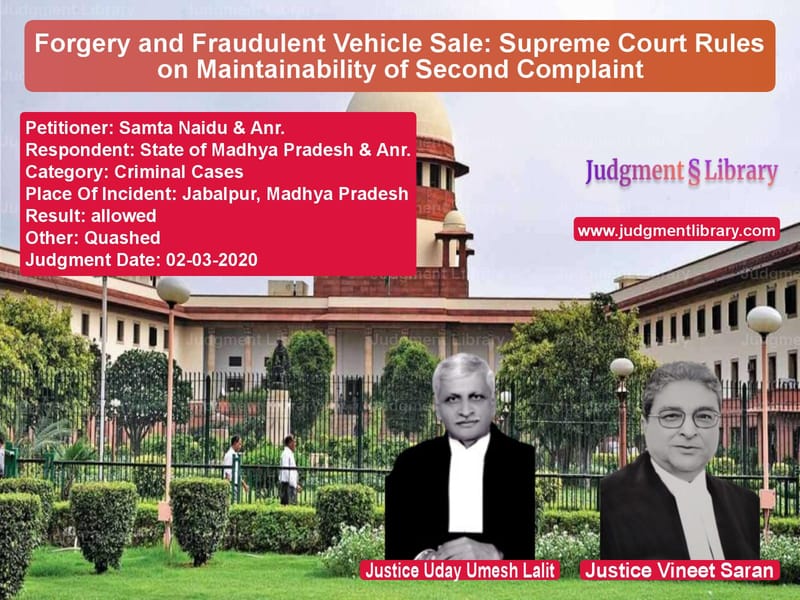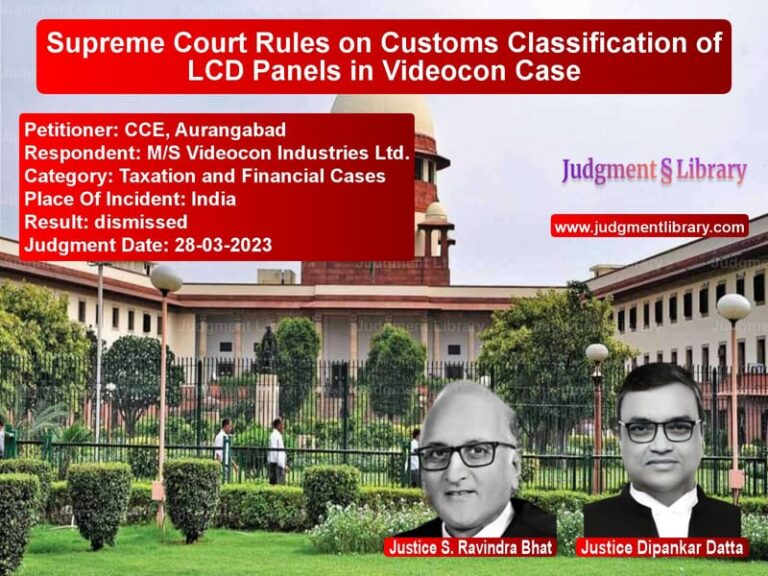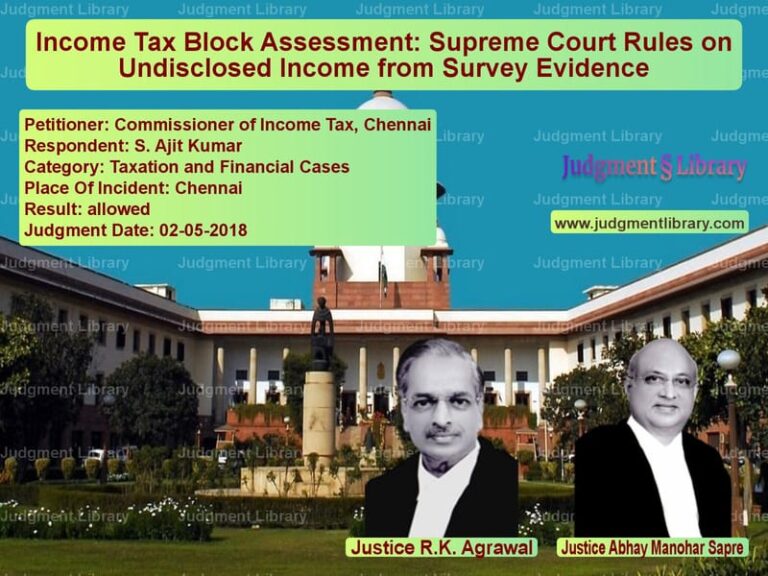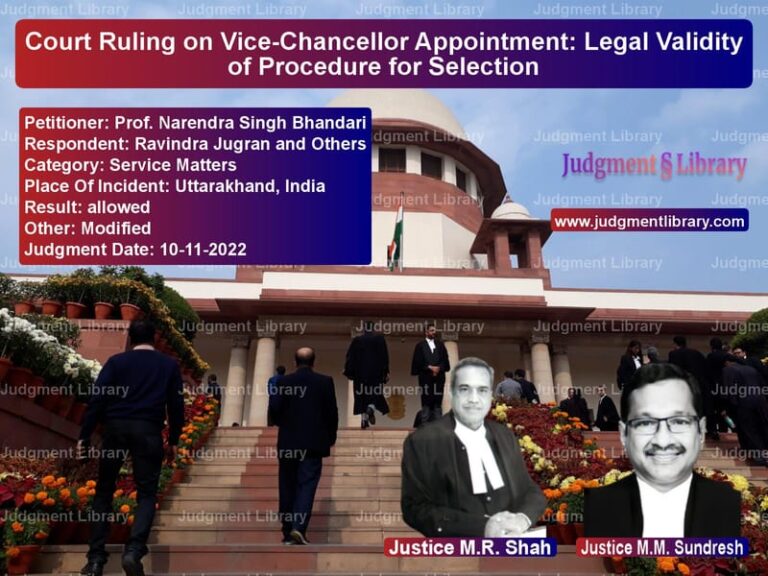Forgery and Fraudulent Vehicle Sale: Supreme Court Rules on Maintainability of Second Complaint
The case of Samta Naidu & Anr. v. State of Madhya Pradesh & Anr. involves a criminal dispute over the alleged forgery and fraudulent sale of a vehicle. The Supreme Court was called upon to decide whether a second criminal complaint, based on the same allegations as a previously dismissed one, was maintainable. This case is significant in clarifying the legal principles governing the filing of successive complaints in criminal cases.
The dispute arose when the complainant, one of the legal heirs of late G.S. Naidu, alleged that his brother and sister-in-law had forged documents to illegally sell a Maruti-800 car that had belonged to their deceased father. The complainant initially filed a criminal complaint, which was dismissed for lack of prima facie evidence. A second complaint was later filed, incorporating additional documents, and was entertained by the lower courts. The Supreme Court, however, ruled against the maintainability of the second complaint and quashed the proceedings.
Background of the Case
G.S. Naidu passed away on December 12, 2001, leaving behind his widow, three sons, and a daughter. The complainant, one of the sons, alleged that his brother (Dilip Naidu) and sister-in-law (Samta Naidu) had forged documents in order to sell the Maruti-800 vehicle owned by their deceased father. The complainant contended that forged signatures of their late father were used on Form 29 and Form 30, along with an affidavit, to facilitate the sale of the vehicle on November 2, 2010.
The complainant first approached the Judicial Magistrate First Class (JMFC), Jabalpur, with a criminal complaint. On July 5, 2013, the magistrate dismissed the complaint under Section 203 of the Criminal Procedure Code (CrPC), finding that no prima facie case was made out.
Key Legal Issues
- Whether the second complaint, based on the same allegations as the first complaint, was legally maintainable.
- Whether additional material evidence in the second complaint justified reconsideration of the case.
- Whether the lower courts were justified in entertaining the second complaint and taking cognizance of the offenses.
Arguments by the Petitioner (Samta Naidu & Anr.)
The petitioners contended that:
- The second complaint was identical to the first complaint, which had been dismissed on merits.
- Filing successive complaints on the same facts amounted to abuse of legal process.
- Under established legal principles, a second complaint can only be entertained in exceptional circumstances, such as when new facts or evidence that could not have been presented earlier emerge.
- The complainant had reasonable time to present all material evidence in the first complaint but failed to do so.
- The second complaint was filed merely to harass the petitioners and lacked any substantial new evidence.
Arguments by the Respondents
The respondents (State of Madhya Pradesh and the complainant) argued that:
- The second complaint included additional material evidence, such as the credit note of Rs. 37,500 issued for the sale of the vehicle and the registration certificate of a new vehicle purchased using the proceeds.
- The complainant became aware of these new facts only after the first complaint was dismissed.
- There was a deliberate act of forgery and fraud by the accused, which justified a fresh investigation.
- The High Court had correctly upheld the second complaint, relying on precedents allowing fresh complaints in cases where new evidence emerges.
Supreme Court’s Observations
The Supreme Court examined the legal principles governing the filing of successive complaints. It relied on past judgments, particularly Pramatha Nath Talukdar v. Saroj Ranjan Sarkar (1962), which established that a second complaint is permissible only under exceptional circumstances, such as:
- When the first complaint was dismissed due to procedural defects rather than merits.
- When new evidence, which could not have been obtained with due diligence earlier, comes to light.
- When the earlier dismissal resulted in a manifest miscarriage of justice.
Applying these principles, the Court ruled:
“An order of dismissal under Section 203, Criminal Procedure Code, is, however, no bar to the entertainment of a second complaint on the same facts but it will be entertained only in exceptional circumstances… It cannot be said to be in the interest of justice that after a decision has been given against the complainant upon a full consideration of his case, he or any other person should be given another opportunity to have his complaint enquired into.”
The Court observed that the core allegations in both complaints were the same and that the complainant had ample opportunity to present all material evidence in the first instance. The Court stated:
“The second complaint was based on additional supporting material, but the fundamental allegations remained unchanged. No reasonable explanation was provided as to why the new material could not have been obtained with due diligence before filing the first complaint.”
Final Judgment
The Supreme Court quashed the second complaint and ruled that it was not maintainable. The Court held:
- The first complaint had been dismissed on merits, and there was no procedural defect.
- The additional evidence presented in the second complaint was not of such nature that it could not have been produced earlier.
- Allowing the second complaint would set a bad precedent, enabling complainants to file successive complaints based on minor additions to the evidence.
Accordingly, the appeals were allowed, and all proceedings under the second complaint were set aside.
Conclusion
The Supreme Court’s ruling in this case reinforces the principle that a second complaint on the same facts cannot be entertained unless exceptional circumstances exist. The judgment highlights the importance of:
- Ensuring that all material evidence is presented in the first instance.
- Preventing abuse of the legal process through successive complaints.
- Protecting individuals from being subjected to repeated criminal proceedings based on the same allegations.
This decision serves as a vital precedent in cases involving forgery, fraud, and multiple complaints, ensuring that criminal proceedings are not misused to harass accused individuals.
Petitioner Name: Samta Naidu & Anr..Respondent Name: State of Madhya Pradesh & Anr..Judgment By: Justice Uday Umesh Lalit, Justice Vineet Saran.Place Of Incident: Jabalpur, Madhya Pradesh.Judgment Date: 02-03-2020.
Don’t miss out on the full details! Download the complete judgment in PDF format below and gain valuable insights instantly!
Download Judgment: Samta Naidu & Anr. vs State of Madhya Prad Supreme Court of India Judgment Dated 02-03-2020.pdf
Direct Downlaod Judgment: Direct downlaod this Judgment
See all petitions in Fraud and Forgery
See all petitions in Judgment by Uday Umesh Lalit
See all petitions in Judgment by Vineet Saran
See all petitions in allowed
See all petitions in Quashed
See all petitions in supreme court of India judgments March 2020
See all petitions in 2020 judgments
See all posts in Criminal Cases Category
See all allowed petitions in Criminal Cases Category
See all Dismissed petitions in Criminal Cases Category
See all partially allowed petitions in Criminal Cases Category







